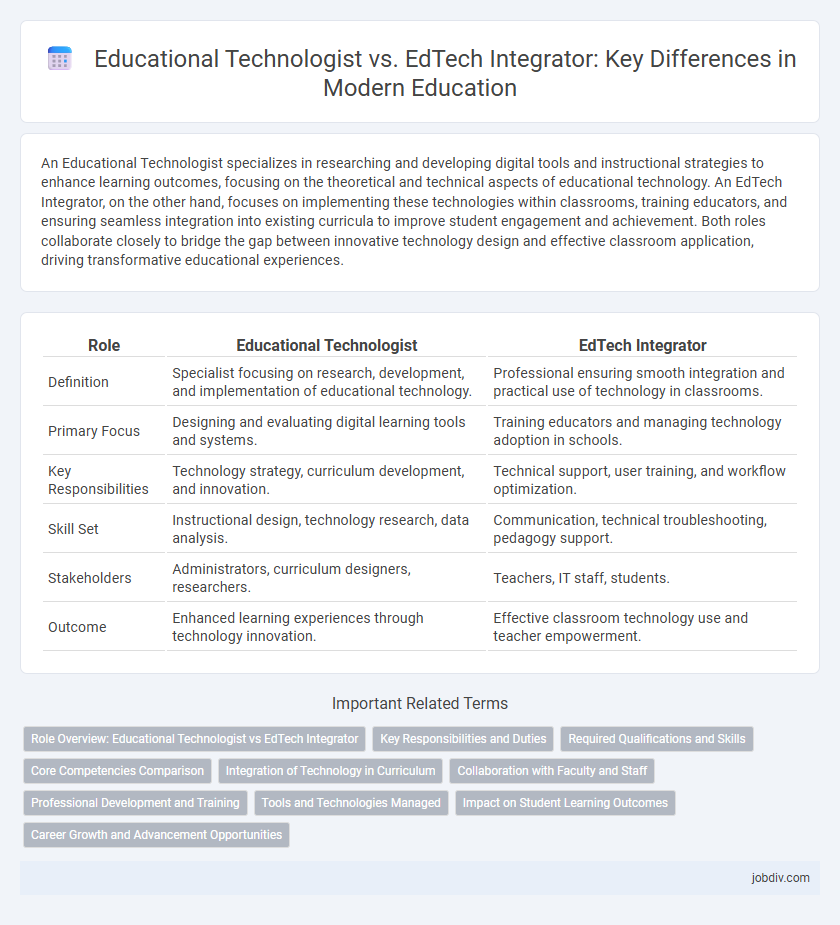An Educational Technologist specializes in researching and developing digital tools and instructional strategies to enhance learning outcomes, focusing on the theoretical and technical aspects of educational technology. An EdTech Integrator, on the other hand, focuses on implementing these technologies within classrooms, training educators, and ensuring seamless integration into existing curricula to improve student engagement and achievement. Both roles collaborate closely to bridge the gap between innovative technology design and effective classroom application, driving transformative educational experiences.
Table of Comparison
| Role | Educational Technologist | EdTech Integrator |
|---|---|---|
| Definition | Specialist focusing on research, development, and implementation of educational technology. | Professional ensuring smooth integration and practical use of technology in classrooms. |
| Primary Focus | Designing and evaluating digital learning tools and systems. | Training educators and managing technology adoption in schools. |
| Key Responsibilities | Technology strategy, curriculum development, and innovation. | Technical support, user training, and workflow optimization. |
| Skill Set | Instructional design, technology research, data analysis. | Communication, technical troubleshooting, pedagogy support. |
| Stakeholders | Administrators, curriculum designers, researchers. | Teachers, IT staff, students. |
| Outcome | Enhanced learning experiences through technology innovation. | Effective classroom technology use and teacher empowerment. |
Role Overview: Educational Technologist vs EdTech Integrator
An Educational Technologist focuses on researching, designing, and implementing innovative learning technologies to enhance educational outcomes, often collaborating with curriculum developers and IT specialists. In contrast, an EdTech Integrator primarily facilitates the adoption and effective use of educational technology within classrooms, providing training and support to teachers and ensuring seamless technology integration. Both roles require a deep understanding of pedagogical principles and technical skills but differ in their scope, with the Educational Technologist oriented towards strategic development and the EdTech Integrator centered on practical application.
Key Responsibilities and Duties
Educational Technologists focus on researching, designing, and developing instructional materials and technologies to enhance learning experiences. EdTech Integrators specialize in implementing and managing educational technology solutions within classrooms, ensuring teachers and students effectively use digital tools to improve educational outcomes. Both roles collaborate to support a technology-rich learning environment but differ in strategic development versus practical application.
Required Qualifications and Skills
Educational Technologists typically require advanced degrees in education technology or instructional design, emphasizing skills in curriculum development, research, and learning theory application. EdTech Integrators often hold certifications in educational technology integration or teaching credentials, with expertise in managing digital tools, training educators, and technical troubleshooting. Both roles demand strong communication abilities and a deep understanding of technology's role in enhancing student learning outcomes.
Core Competencies Comparison
Educational Technologists specialize in designing, developing, and evaluating instructional materials, emphasizing technology integration aligned with pedagogical theories and data-driven decision making. EdTech Integrators focus on implementing technology tools within classrooms, training educators, and managing digital resources to enhance teaching and learning processes. Core competencies for Educational Technologists include instructional design, research methodologies, and technology evaluation, while EdTech Integrators excel in technology deployment, professional development, and troubleshooting educational software.
Integration of Technology in Curriculum
Educational Technologists design and develop innovative digital tools and resources that align with pedagogical theories to enhance learning outcomes. EdTech Integrators focus on embedding these technologies seamlessly into existing curricula, ensuring teachers are equipped to use tools effectively for student engagement and achievement. Both roles collaborate to bridge the gap between technological potential and practical classroom application in modern education systems.
Collaboration with Faculty and Staff
Educational Technologists specialize in designing and implementing technology resources to enhance curricular goals, collaborating closely with faculty to tailor digital tools that meet specific teaching needs. EdTech Integrators focus on embedding these technologies into daily classroom activities, working alongside staff to ensure seamless adoption and effective usage. Both roles prioritize ongoing communication and professional development to foster a collaborative environment that supports innovative teaching practices.
Professional Development and Training
Educational Technologists specialize in designing and implementing comprehensive professional development programs that focus on integrating technology into curriculum effectively. EdTech Integrators provide hands-on training and real-time support for educators, emphasizing practical application of digital tools within the classroom environment. Both roles enhance teacher proficiency and promote technology adoption, but Educational Technologists prioritize strategic planning while EdTech Integrators focus on day-to-day instructional technology use.
Tools and Technologies Managed
Educational Technologists specialize in researching, developing, and implementing cutting-edge learning tools such as adaptive learning software, virtual reality platforms, and data analytics systems to enhance instructional design. EdTech Integrators focus on the practical deployment and management of classroom technologies including interactive whiteboards, learning management systems (LMS), and student response devices to facilitate daily teaching activities. Both roles require expertise in digital tools, but Educational Technologists emphasize innovation and strategy, while EdTech Integrators prioritize hands-on technology integration and user training.
Impact on Student Learning Outcomes
Educational technologists design and implement effective technology-driven curriculum strategies that enhance student engagement and comprehension, directly improving learning outcomes through tailored digital resources. EdTech integrators focus on embedding these technologies seamlessly into classroom environments, ensuring educators are proficient in utilizing tools to maximize instructional impact. Together, their roles synergize to optimize technology use, resulting in measurable gains in student performance and skill acquisition.
Career Growth and Advancement Opportunities
Educational Technologists typically focus on designing and implementing innovative learning solutions, often advancing into roles such as instructional coordinators or learning experience designers. EdTech Integrators specialize in deploying and managing technology tools within schools, with career growth leading towards technology director or digital learning coach positions. Both roles offer strong demand in the education sector, with increasing opportunities driven by digital transformation and the emphasis on tech-enabled learning environments.
Educational Technologist vs EdTech Integrator Infographic

 jobdiv.com
jobdiv.com